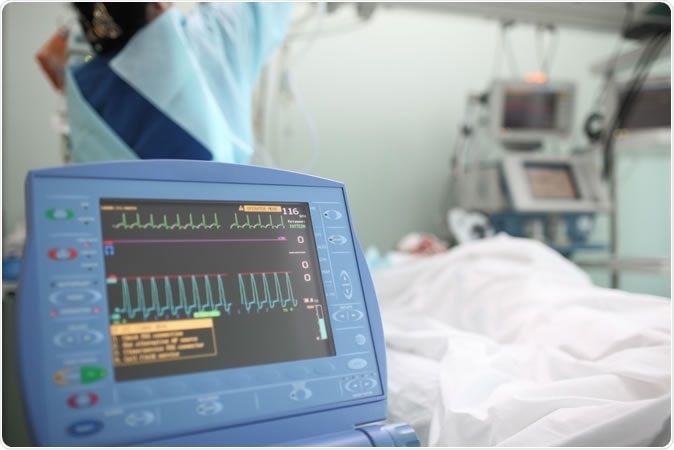More than 220,000 American adults die suddenly of cardiac causes – a phenomenon called sudden cardiac death. Some sources put it as closer to 400,000. Both inexplicable and distressing, this has been the subject of a new study published in the Journal of the American College of Cardiology and presented at the American Heart Association’s scientific session. Led by researchers at Massachusetts General Hospital (MGH) and the Broad Institute of MIT and Harvard, this collaborative effort has led to the discovery that some rarely found differences in certain genes contribute to this occurrence.

Image Credit: sfam_photo / Shutterstock
Sudden cardiac death
Sudden cardiac death is the No. 1 cause of natural death in the USA. In these cases death occurs within one hour of the first symptom, typically a sudden acceleration of the heartbeat, or dizziness. The heart stops beating in rhythm, causing the blood supply to the rest of the body to fail. In more than 50% of cases, the heart stops without any preceding symptoms at all.
As many as 3 million people in the US are at risk, or about 1% of the population. In most cases, the individual has no history of symptoms related to heart disease. The findings from the new study could result in preventive screening to detect such high-risk people, since they are unlikely to develop symptoms prior to their death.
Some risk factors for sudden cardiac death have been identified, such as:
- History of heart attack or coronary artery disease, especially– ¾ of all sudden cardiac deaths occur after a heart attack, and it is most likely in the first 6 months after such an occurrence
- Smoking, family history of heart disease, dilatation of the heart, high blood lipids – all of which predispose to coronary heart disease
- History or family history of cardiac arrest, arrhythmia (abnormal heart rhythm)
- Family history of sudden cardiac death
- Episodes of fainting without obvious cause
- Heart failure – up to 9-fold risk of cardiac arrhythmia
- Hypertrophic heart disease
- Imbalance of salts, obesity, diabetes, drug abuse
The study
The researchers examined the genes of 600 people, all adults, who died of sudden cardiac death. They compared these sequenced genes with the gene profiles of 600 controls with no apparent illness. This makes the current study the largest in which gene sequencing was carried out for this group of individuals, as well as the first to include a group of controls. The analysis was done by a clinical geneticist, who looked at all the gene differences identified.
In the next step, they studied genes from over 4,500 adults who had reached middle age without any clinical features of heart disease. They looked for disease-producing genes among this group. The follow-up in these individuals has now gone on for over 14 years.
The findings
Among the genetic variants found in the 1,200 cases and controls, there were 15 that could produce a clinically significant impact on the patient’s health. All 15 were found in the genes of people who suffered sudden cardiac death. None were found in controls.
Calculating the prevalence, the researchers found that a disease-causing variant in these genes was likely to be present in about 2.5% of cases and not at all in controls.
In the general study, they found that 0.9% of the asymptomatic individuals (41 in number) carried pathogenic gene variants. Moreover, these variants were linked to a more than 3-fold risk of death from heart or blood vessel disease compared to the others.
Implications
Researcher Amit V. Khera says, “This finding indicates that genetic testing – if made widely available – can provide a way to identify high-risk individuals. If identified, we have a variety of approaches proven to prevent disease onset available within routine clinical practice.”
The researchers now plan to carry out gene sequencing on thousands of adults who are seen at MGH and its affiliate hospitals, who have volunteered to take part in research that focuses on how genetic and environmental factors interact or act separately to influence the risk of common illnesses. The team will focus on identifying the 1 percent of patients who have these rare gene variants that are associated with heart disease, so they can take preventive steps to avoid sudden cardiac death. Some programs aimed at such patients include the Cardiovascular Genetics Program, and the new MGH Preventive Genomics Clinic which is part of the primary care system at this hospital.
Khera says optimistically, “Our hope is to empower our patients to better understand, predict, and prevent bad health outcomes--especially irreversible tragedies such as sudden cardiac death--using genetic information.”
Journal reference:
Amit V. Khera, Heather Mason-Suares, Deanna Brockman, Minxian Wang, Martin J. VanDenburgh, Ozlem Senol-Cosar, Candace Patterson, Christopher Newton-Cheh, Seyedeh M. Zekavat, Julie Pester, Daniel I. Chasman, Christopher Kabrhel, Majken K. Jensen, JoAnn E. Manson, J. Michael Gaziano, Kent D. Taylor, Nona Sotoodehnia, Wendy S. Post, Stephen S. Rich, Jerome I. Rotter, Eric S. Lander, Heidi L. Rehm, Kenney Ng, Anthony Philippakis, Matthew Lebo, Christine M. Albert, Sekar Kathiresan, Rare Genetic Variants Associated With Sudden Cardiac Death in Adults, Journal of the American College of Cardiology, 2019, ISSN 0735-1097, https://doi.org/10.1016/j.jacc.2019.08.1060.